University of Natural Resources and Life Sciences, Vienna
|
Universität für Bodenkultur Wien (BOKU) | |
 | |
Former names | Hochschule für Bodenkultur |
|---|---|
| Motto | Universität des Lebens |
Motto in English | University of Life |
| Type | Public |
| Established | 1872 |
| Rector | Hubert Hasenauer |
Academic staff | about 2,000 |
Administrative staff | about 500 |
| Students | about 12,500 |
| Location | Vienna, Austria |
| Website |
boku.ac.at Prospectus |
The University of Natural Resources and Life Sciences, Vienna, or simply BOKU (derived from its German name, Universität für Bodenkultur Wien, German pronunciation: [ˌunivɛʁziˈtɛːt fyːɐ̯ ˈboːdn̩kʊlˌtuːɐ̯ viːn] (![]()
Campus
After 27 years at Palais Schönborn the City of Vienna decided in 1896 to build a new campus at Türkenschanzpark in the 18th district. The departments of sustainable agriculture, soil science, horticulture, animal husbandry, economics and social sciences are still headquartered at this original campus. Another city campus, located at Muthgasse in the 19th district near the Heiligenstadt underground station, is the headquarters for the biotechnology, chemistry, plant sciences, water resource management, waste management and food sciences departments. There is also a research facility complex in Tulln, north of the city, with biotechnology and agricultural sciences laboratories and facilities. Other important locations and testing fields are Groß-Enzersdorf (Lower Austria), Jedlersdorf (Vienna), Knödelhütte (Vienna), Heuberg/Rosalia (Burgenland) and the Water Cluster Lunz am See (Lower Austria).[2]
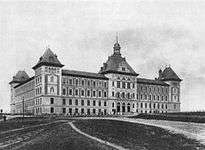 Hochschule für Bodenkultur, today's Gregor-Mendel-Haus (1896)
Hochschule für Bodenkultur, today's Gregor-Mendel-Haus (1896)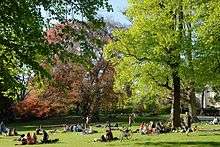 Türkenschanzpark (original campus)
Türkenschanzpark (original campus)- Gregor-Mendel-Haus (original campus)
- Wilhelm-Exner-Haus (original campus)
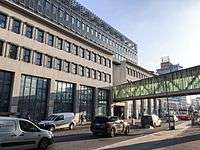 Armin-Szilvinyi-Haus (Muthgasse campus)
Armin-Szilvinyi-Haus (Muthgasse campus)
Departments and Research Units
15 Departments of BOKU [3]
- Department of Material Sciences and Process Engineering (Department für Materialwissenschaften und Prozesstechnik)
- Department of Biotechnology (Department für Biotechnologie)
- Department of Water, Atmosphere and Environment (Department Wasser-Atmosphäre-Umwelt)
- Department of Nanobiotechnology (Department für Nanobiotechnologie)
- Department of Chemistry (Department für Chemie)
- Department of Integrative Biology and Biodiversity Research (Department für Integrative Biologie und Biodiversitätsforschung)
- Department of Food science and Technology (Department für Lebensmittelwissenschaften und -technologie)
- Department of Landscape, Spatial and Infrastructure Sciences (Department für Raum, Landschaft und Infrastruktur)
- Department of Economics and Social Sciences (Department für Wirtschafts- und Sozialwissenschaften)
- Department of Sustainable Agricultural Systems (Department für Nachhaltige Agrarsysteme)
- Department of Civil Engineering and Natural Hazards (Department für Bautechnik und Naturgefahren)
- Department of Forest- and Soil Sciences (Department für Wald- und Bodenwissenschaften)
- Department of Crop Sciences (Department für Nutzpflanzenwissenschaften)
- Department of Agrobiotechnology, IFA-Tulln (Interuniversitäres Department für Agrarbiotechnologie, IFA-Tulln)
- Department of Applied Genetics and Cell Biology (Department für angewandte Genetik und Zellbiologie)
Research Units and Initiatives [4]
- Center for Development Research
- Center for Global Change and Sustainability
- Center for Agricultural Sciences
- Vienna Institute of BioTechnology
- Bio-Resources & Technologies Tulln
Studies
BOKU offers 8 BSc programmes and 28 MSc programmes.[5] Most of them allow various specialisations and possibilities for majors. The language of instruction is partly German, partly English. For many MSc programmes the language of instruction is English only. In general, programmes start each year in October and take three years for a BSc diploma with 180 ECTS credits and two years for a MSc diploma with 120 ECTS credits. Studies are in the field of natural resources management, life sciences & biotechnology, civil & environmental engineering, landscape planning, agriculture, forestry and winemaking.
The PhD programme is a three-year programme with 180 ECTS credits which consists of a research component (conducting research under supervision and writing a thesis) and a smaller education component. In order to guarantee adequate supervision, the research subject must fit the research programme of BOKU and its institutes.
Due to BOKU's extensive world-wide engagement, the university offers many international MSc programmes as joint or double degree. It is also a member of the Euroleague for Life Sciences university network, partnering with University of Copenhagen, Faculty of Science (SCIENCE), Swedish University of Agricultural Sciences (SLU), Czech University of Life Sciences Prague (CULS), University of Hohenheim (UHOH), Warsaw University of Life Sciences (WULS-SGGW), Wageningen University and Research Centre (WUR), China Agricultural University (CAU), Hebrew University of Jerusalem, Robert H. Smith Faculty of Agriculture, Food and Environment (HUJI), Lincoln University, New Zealand (LU) and Cornell University, College of Agriculture and Life Sciences (CALS).
Notable alumni
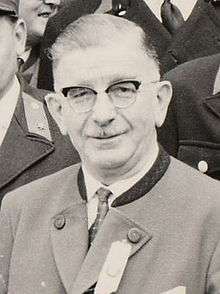
- Leopold Figl – Federal Chancellor of Austria (1945–1953)
- Franz Fischler – EU Commissioner for Agriculture, Rural Development and Fisheries (1995–2004)
- Nikolaus Berlakovich – Federal Minister of Agriculture and Forestry (2008–2013)
- Luis Durnwalder – Governor of South Tyrol (1989–2014)
- Günter Haiden – Federal Minister of Agriculture and Forestry (1976–1986)
- Sabine Herlitschka – CEO of Infineon Technologies Austria (2014–present)
- Hans Lechner – Governor of the State of Salzburg (1961–1977)
- Hermann Neubacher – Mayor of Vienna (1938–1940)
- Erwin Pröll – Governor of Lower Austria (1992–2017)
- Josef Pröll – Federal Minister of Finance and Vice-Chancellor (2008–2011)
- Hans Tuppy – Biochemist und Federal Minister of Science (1987–1989)
- Oskar Weihs – Federal Minister of Agriculture and Forestry (1970–1976)
- Andrä Rupprechter – Federal Minister of Agriculture and Forestry (2013–2017)
Notable scientists
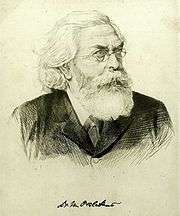
- Walter Bitterlich - Forest Scientist and Inventor
- Adolf Cieslar - Forest Scientist
- Adolf Ritter von Guttenberg - Forest Scientist
- Herbert Killian - Forest Historian
- Josef Kisser - Botanist
- Helga Kromp-Kolb – Meteorologist und Climate Scientist, Austrian Scientist of the Year 2005
- Wilhelm Neurath - Economist
- Emil Perels - Land Planner
- Karl Prachar - Mathematician
- Karl E. Schedl - Zoologist and Forest Scientist
- Franz Schwackhöfer - Chemist
- Erich von Tschermak-Seysenegg - Plant researcher
- Martin Wilckens - Animal researcher and Founding Rector of BOKU
Notes and references
- ↑ https://online.boku.ac.at/BOKUonline/StudierendenStatistik.html
- ↑ https://www.boku.ac.at/en/fm/themen/orientierung-und-lageplaene/standort-tuerkenschanze/
- ↑ https://www.boku.ac.at/en/departments/
- ↑ https://www.boku.ac.at/en/weitere-wissenschaftliche-einrichtungen-initiativen-plattformen-netzwerke-und-beteiligungen/
- ↑ https://www.boku.ac.at/en/studienangebot/
External links
- University of Natural Resources and Life Sciences, Vienna (English version)
- Prospectus (English version)
Coordinates: 48°14′12″N 16°20′14″E / 48.23667°N 16.33722°E